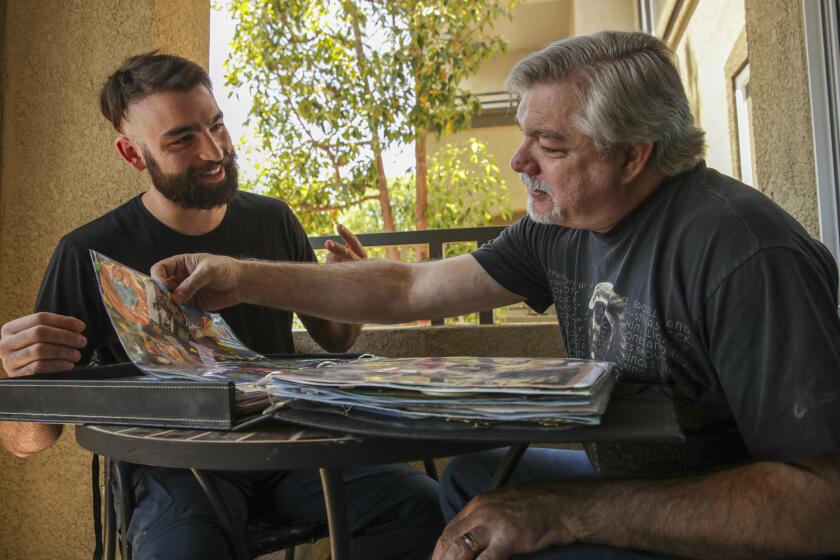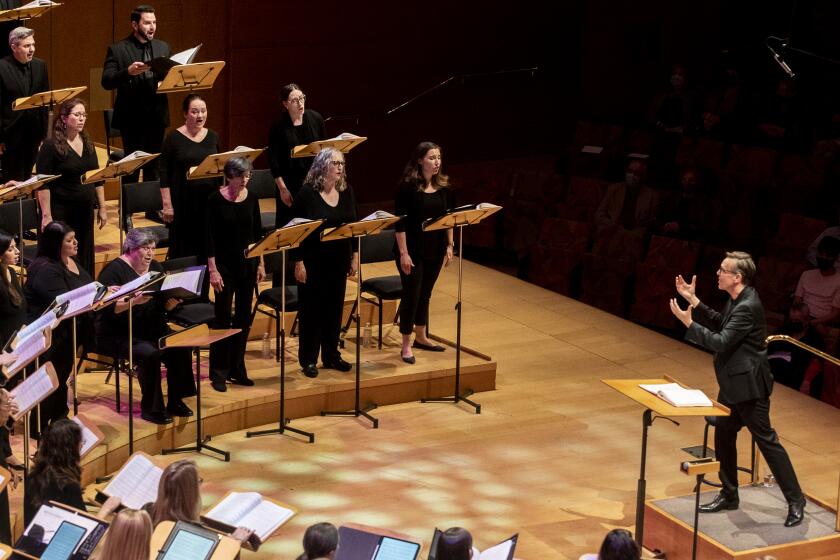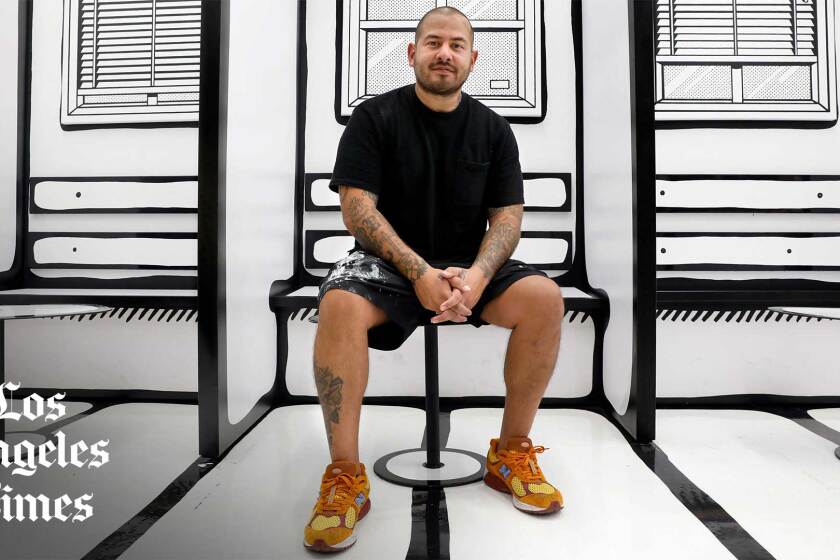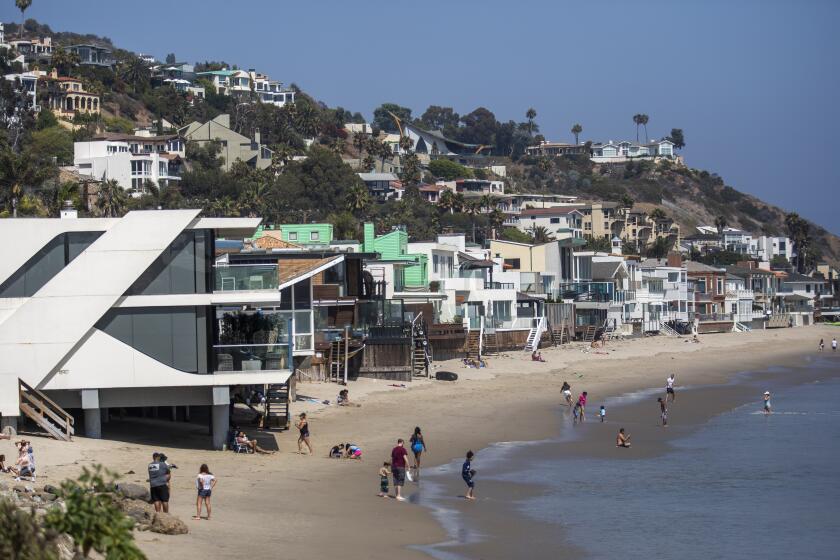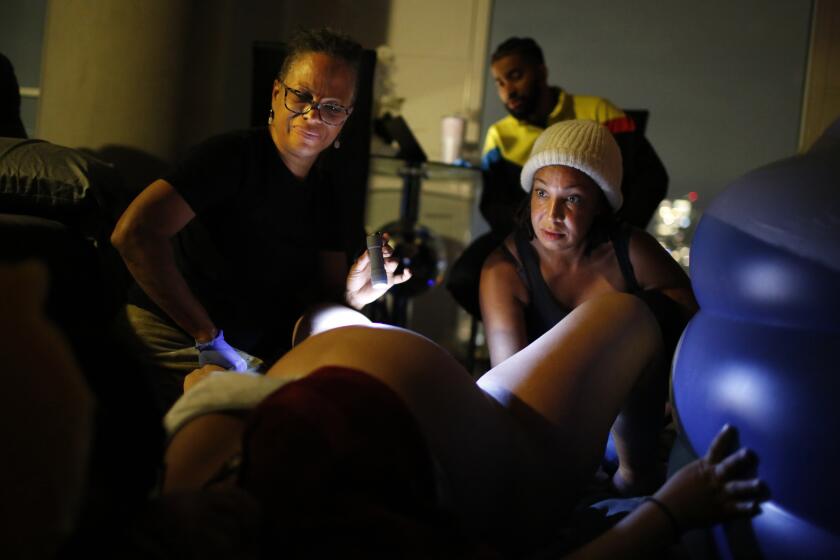Gifts from my two mothers: One Korean, one Black
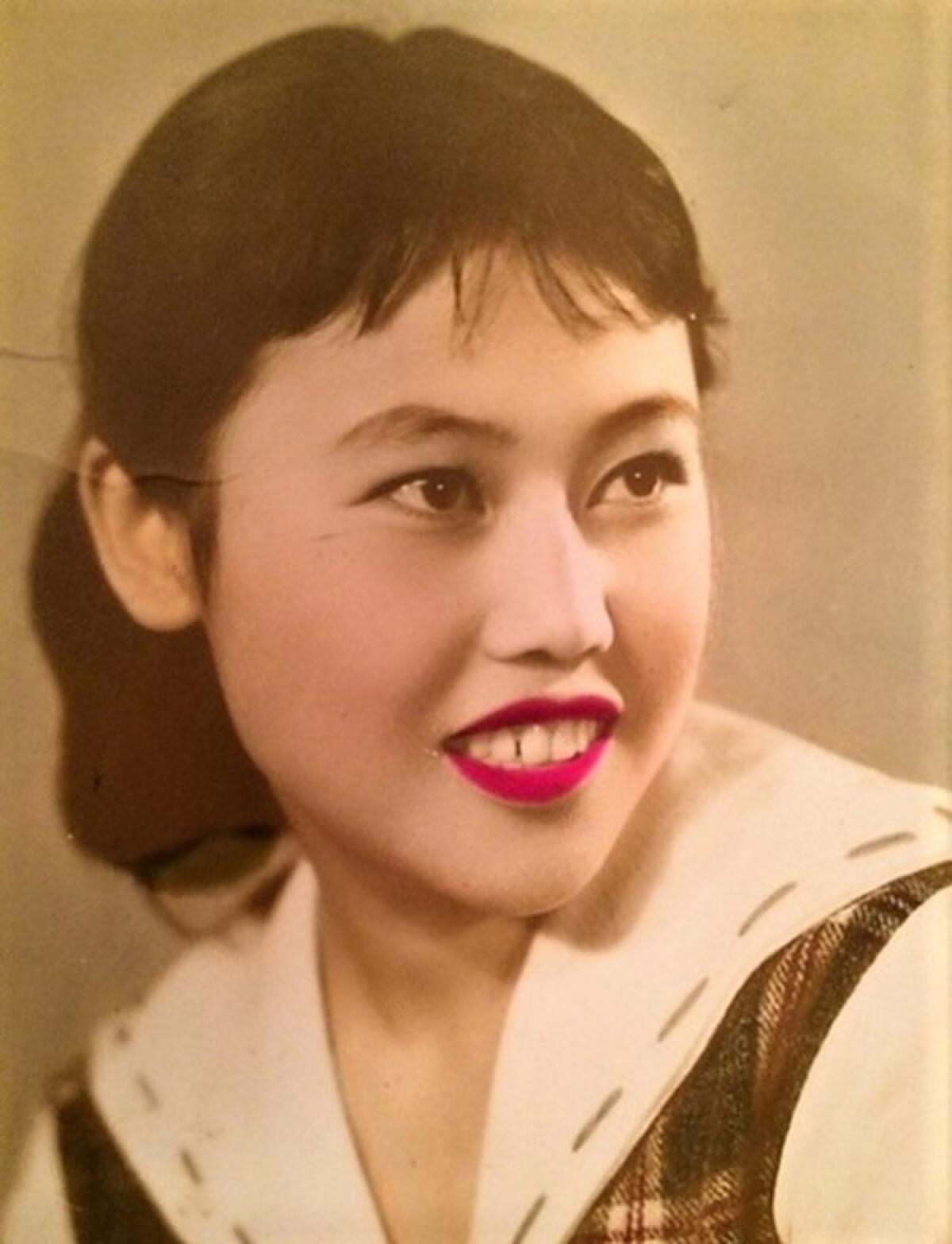
- Share via
Family legend has it that I was found tied to a tree. The circumstances are unclear, but it appears my birth mother had left me there in a South Korean coastal town so I could be taken to an orphanage.
My adoptive mother told the tree story to my godmother, who later told me, but the story is incomplete and so typical of my childhood in Korea. Fragmented memories, broken narratives, legal documents and my birth country’s history are all I have to piece together what brought me, a child of war, from Asia to a new home in Compton, California, USA.
My only memory of the woman I think must have been my birth mother is in a small space, probably a shanty. She is strikingly beautiful, with long black hair and ruby lips. I am mesmerized by those lips and the shiny tube with the ruby red paste that paints them to perfection.
My other memory is of Sonyeon — “boy” in Korean (I’ve forgotten his name) — and he is my constant companion. Sonyeon and I are street urchins, surviving by sucking tasty morsels we find in the cone-like seashells. Sonyeon is expert at it. We are often on food-acquiring adventures.
Then one day in what I would learn was 1957, I woke up at the Mah San Orphanage in the city of Masan. I have no idea how I got there — I was about 4½ years old — but I know that the day before, I was with Sonyeon and the lady with the red lipstick.
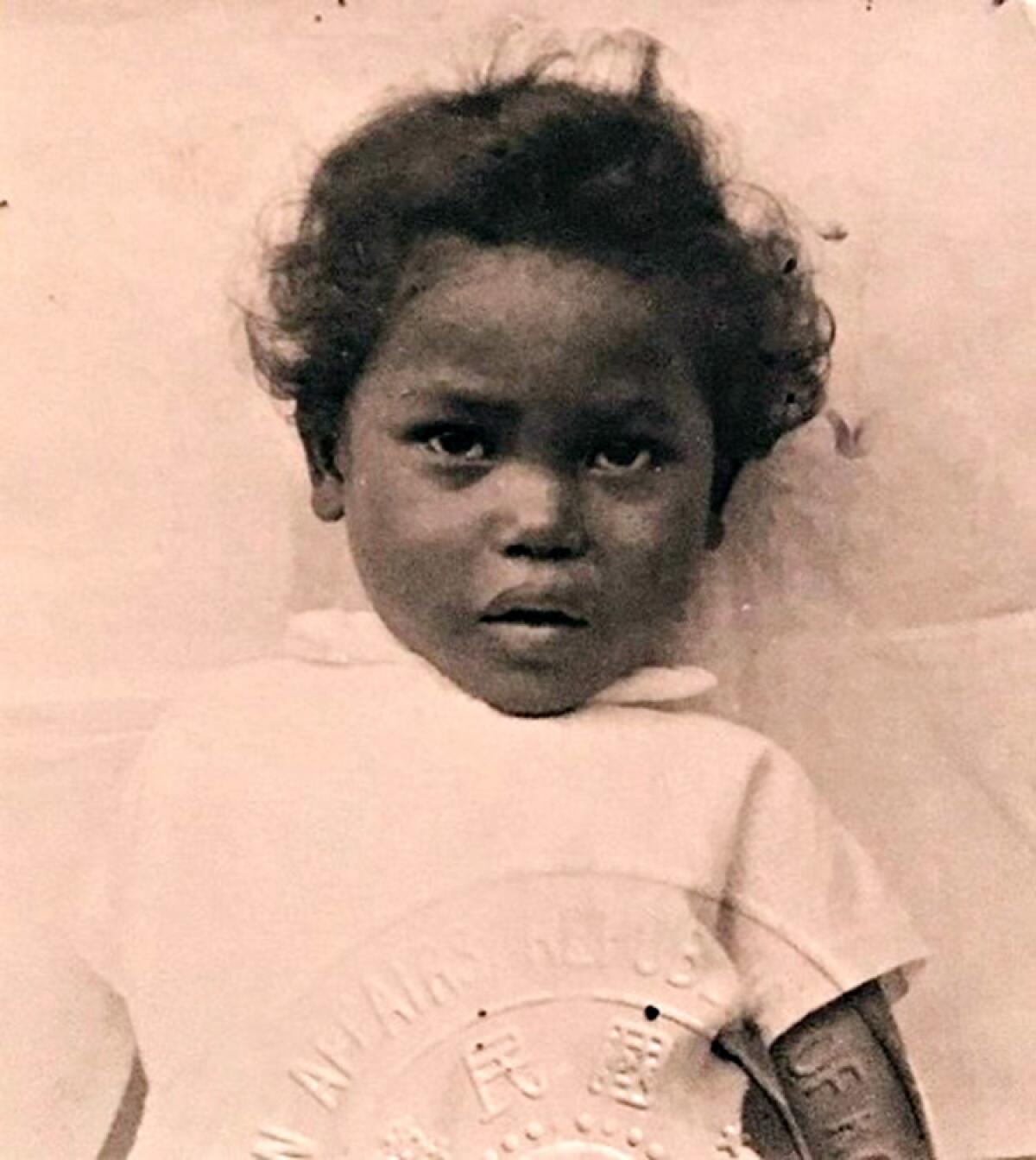
Born to a Korean mother and a Black father during the Korean War, I was mixed-race in a country that believed in pure bloodlines even as it reaped the financial benefits of the women sanctioned to comfort American soldiers. As a consequence, thousands of unwanted babies were destined for abandonment, disease and death. Those who survived would probably face a lifetime of discrimination and hardship as orphans.
“Sometimes I feel like a motherless child, a long way from home.” The song mournfully sung by Billie Holiday was my lament for years. Yet, in reality, I am one lucky girl with two mothers who loved me dearly. They made sacrifices for Saundra Henderson Windom — nee Chang Bang Sun — and now I’m able to share that story with you.
For over 60 years, I saw myself as the beginning of my children’s and grandchildren’s maternal lineage, but that changed one evening in March 2018 when a young lady emailed me to inquire about our DNA relationship. With curious introductions, we speak by phone. “Hi, I’m Sandy.”
“I’m Yvette,” she says.
Yvette Woolfolk explains I’m her top match in a DNA analysis because, she and her father speculate, I’m probably the result of her father’s eldest brother, a man known for surprising their family with unexpected offspring. She texts me family photographs, including one of a beautiful young Korean woman with red lipstick.
::
“What is your name?” someone asks my first morning at the orphanage.
I am emaciated with the typical kwashiorkor belly of the malnourished. I am sad, cold and hungry. I wonder where Sonyeon is. But I am able to provide a name: “I’m Bang Sun.”
I don’t offer a last name, so am given the surname of the orphanage’s founder, Chang. I am sometimes called “Bang Sun-ah,” an endearment that sounds similar to Bong Soon-ah, a flower used to dye fingernails. I like to fantasize my mother named me after the flower.
All his life, Joseph Arriaga carried a painful secret about his origins. The truth turned out to be far different.
At the orphanage, non-Korean adults visit but take few children. I want to be one of the chosen. One day I meet a non-Korean with a black mustache, bushy eyebrows and deep-set, gentle hazel eyes that show compassion. I follow him around like he is holding the glass slipper to my better life. On a later visit, the mustache man chooses me.
He is Harry Holt, founder of the Holt Orphanage in Seoul, and on July 7, 1957, I join him, his daughter, Molly, and an interpreter, David Kim, on the train to Seoul. They would orchestrate my destiny, to become the little girl of an American Christian family, the Hendersons, of Compton.
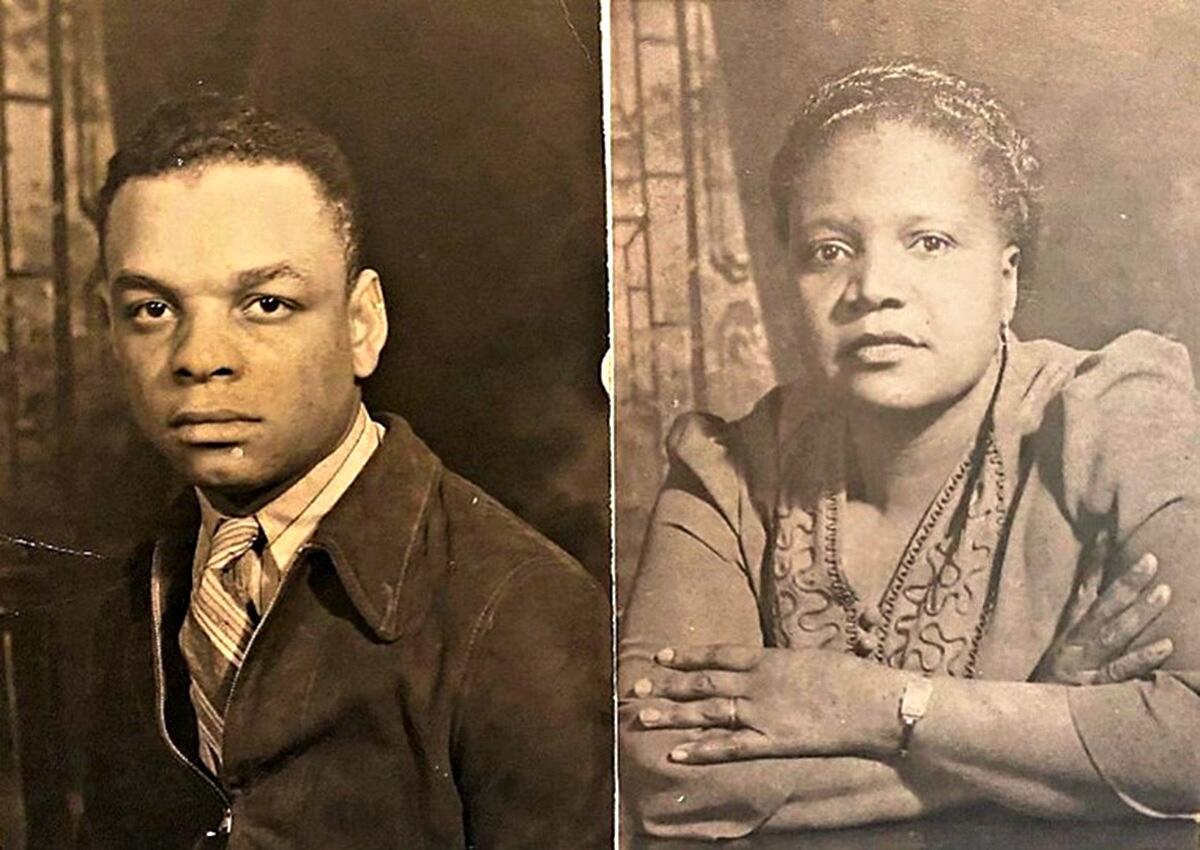
My parents, James and Clemmie Henderson, already had a son, Virgil, and later adopt another girl from Korea, Loretta. I love that I can engage in both Black and Korean cultures. But one day, it all changes.
Out of the blue, Mama announces, “Don’t ever speak of Korea again — think of it as a bad word.” My sister and I gasp and look at each other in disbelief. I’m to fully become Saundra Henderson — Bang Sun relegated to a dusty memory. Mama never explains why.
Loretta and I reluctantly conform to a code of silence that eventually erodes our language and our memories. From this point on, my life would be marked by a constant grinding away at my ethnicity and identity.
::
After Yvette reached out to me, I did the math and figured out that her mother could have been my mother. Another DNA test confirmed we are half siblings. She too is half Korean, half Black. I had already traveled to Korea twice to visit the Holt orphanage in hopes of finding a connection, and unbelievably, my Korean side finds me in the U.S.
Sadly, Yvette tells me that our Omma, mother, died in October 2010, at age 73. Then, another revelation.
“By the way,” Yvette says. “You know, my mom’s name is Sandy too.”
Have you ever heard something you think you didn’t hear, and it doesn’t sink in because it flies over you? I don’t respond, because there is no place in my brain to register that we share a name. It is too much to comprehend. My birth mother was Hyon Ok Choi Woolfolk, aka “Sandy.”
Whether known as hallelujah, alleluia or alleluya, an ancient Hebrew word plays a big role in music, faith and culture.
I finally meet my new family in the Sacramento area on Sept. 15, 2018, which happened to be the birthday of the woman I will always call “Mama.” The moment is dreamlike, emotional. The outline of the beautiful lady with red lipstick was now being colored in as each of her family members brings life to my dormant image.
Omma married “Papa Harry,” Harrison Day Woolfolk, a soldier in postwar Korea, and later relocated to America. Along with Yvette, they had two sons, Harrison Jr. (aka Dee) and James.
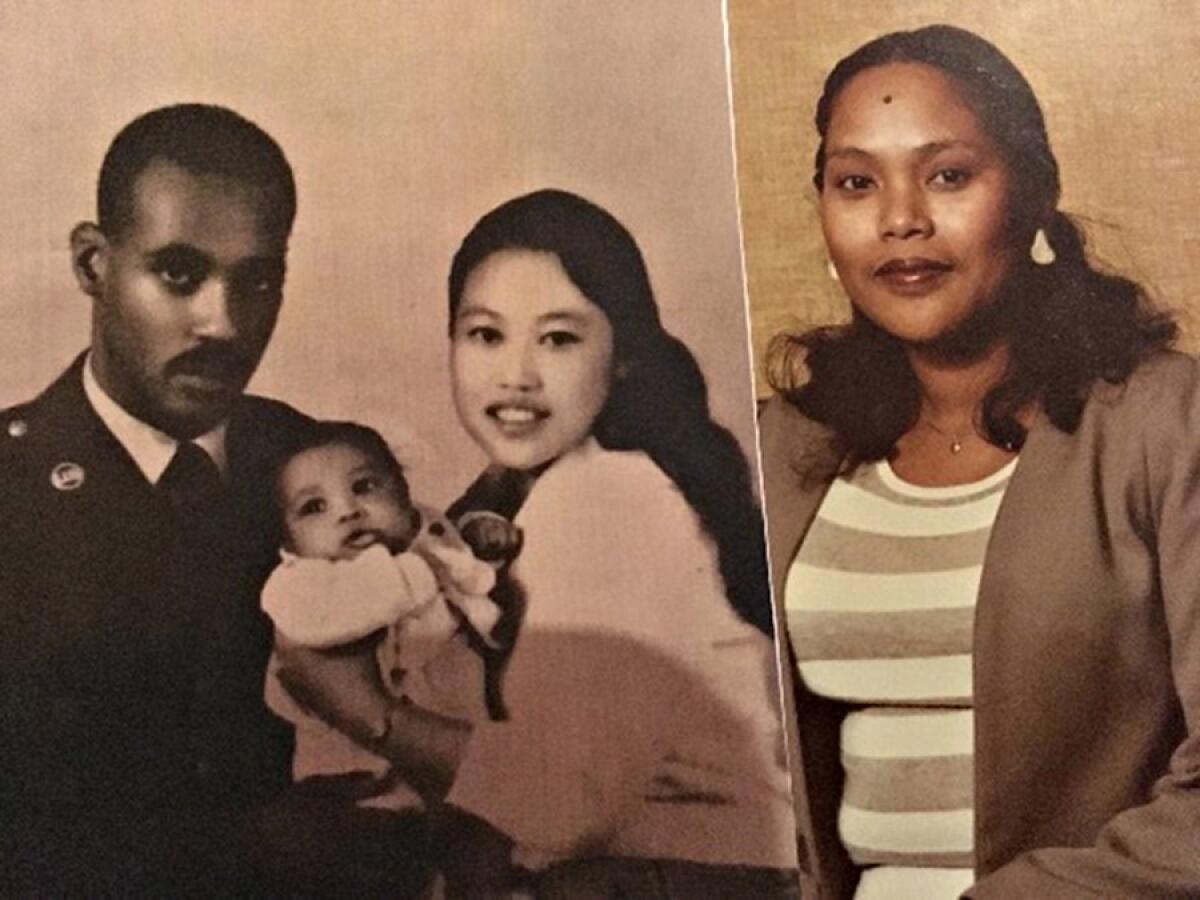
As Papa Harry regales my family, who’d accompanied me on the visit, I learn that as a teen during the war, my mother and her family had to flee to the south, and in that flight she became separated from them. She never shared details about that time of separation, but I suspect that period probably included my coming into the world.
Papa Harry says that when he first met her at the NCO (non-commissioned officers) club, what impressed him most about her was the quality of her English, that she was quite opinionated and that she was extremely intelligent.
Two stories demonstrate the depth of her intelligence, attention to detail, patience and tenacity. When Papa Harry spoke at a funeral for one of their Korean friends, she wrote out what he wanted to say in Korean phonetically, and all were amazed at his precise pronunciation. He also boasts that when she worked at a major plant nursery, her colleagues selected her as their union rep. During meetings, she fluidly interpreted between languages.
I can relate to this tenacity. I was an educator, eventually retiring as a principal, and when I was asked to be a middle school girls’ basketball coach, I had zero experience playing any sport. But I did grow up during the John Wooden UCLA coaching era. I reviewed and applied his practice drill tapes, and voila — finally a 9-1 winning season.
Dee shares that Omma loved sports, including golf and football, but her favorite was baseball, from Little League to the major leagues. “She could even rattle off a player’s stats if asked,” he says.
Joshua Vides’ creations have turned the former scofflaw graffitist into an illustrator and visual artist sought after by a growing list of global brands.
When Papa Harry was still active in the military, she was the chauffeur and biggest cheerleader for all their children’s endeavors. Dee’s teammates loved coming to their home because Omma was known for her multifaceted culinary skills, from Hungarian to Korean.
Yvette and Dee’s wife, Brenda, re-create Omma’s delicious Korean recipes — kalbi, japchae, bulgogi and fried rice — which allowed me to imagine her kitchen banter while preparing dinner and the aromas luring us to the table. I can feel her presence.
After dinner, Yvette shares family photo albums. Seeing the pure joy of my mother’s face after becoming a halmeoni (grandmother) of four again reminded me of myself, who too adores my grandchildren. Dee’s son Christian reflects, “Much like you, she would dance around with us, sing with us and made sure that we were enjoying ourselves as kids.”
My half siblings and I came to appreciate how the impact of circumstances can lead to different outcomes. In my case, the woman they knew who made dinner for her sons’ teammates was the same woman whose benevolence, under different circumstances — perhaps not being able to feed me or scared for my life — led her to make an enormous sacrifice, to give up her child.
My mother and I share similar physical features, the love of cooking, and as I came to know, Omma was active with her church community too. We apparently have the same quiet demeanor, yet we’re in total control. Lastly, and I’m still blown away by this, we share the same name, “Sandy.”
The access wars that have flared anew this summer feel as old as the rocky point at one end of the Cove and as new as the next tide.
I don’t know why my Mama Clemmie chose Saundra/Sandy when we first met at the San Francisco airport. I clearly remember telling her, “Nae ileum-eun Saundra anibnida, Je ileum-eun Chang Bang Sun, ibnida!” (I am NOT Saundra; I am Chang Bang Sun!)
Now I know, like Omma, I can be both Korean and American. All I can say is for both Sandys, “it’s an orchestration.” There is so much within me that I see and share with her from all I am learning. It is only now that I realize that as a child, my being mesmerized by her red lipstick has been a signature identifying look for me, as I have been wearing red lipstick ever since I was able to buy my own. Even behind the mask of the pandemic, I pay homage to her daily with red lipstick.
I‘ve also come to understand and appreciate Mama more. She was short on demonstrative love but provided great direction in life and without question loved me. And though I’ll never understand why she insisted I reject my Korean heritage, I see qualities she and Omma shared.
Like my birth mother experienced in the ‘50s, the ‘60s were a tumultuous time for Black families in America. My proud and capable Mama showed me what leadership looked like when she offered our residence as the neighborhood polling place.
I owe so much to Mama that I still practice: my consistent and fortified Christian faith; my prudence on financial matters; my cooking and baking skills; my ability to hold my own on the dance floor; to act in giving to those less fortunate; to give in to sentimentality of tearjerkers.
From my dubious beginnings to age 68, I now understand and see the orchestrations of my life. It was love that lifted me … the love of a faceless woman who desperately wished for my survival, and the love of a woman thousands of miles away whose unselfish generosity gave me the wings to fly. What I didn’t get from either of my parents I got from having children — Gibran, Ravi, Amir — children who taught me unconditional love and whom I too could teach how to fly.
After writing my memoir, “Orchestration,” I came to realize just how blessed of an orphan I was. As Celie in “The Color Purple” said, “Dear God, I am here” …. and as the beneficiary of the life I was given, I developed a relationship with He who orchestrated my life in such a beautiful way. I thank God for my two mothers.
From here on out, Sept. 15 — Mama Clemmie’s birthday and the reunion with Omma’s family, I will commemorate as the day to honor my two mothers, and the gifts they bestowed upon me, knowingly and unknowingly breathing life into me, their daughter, Sandy.
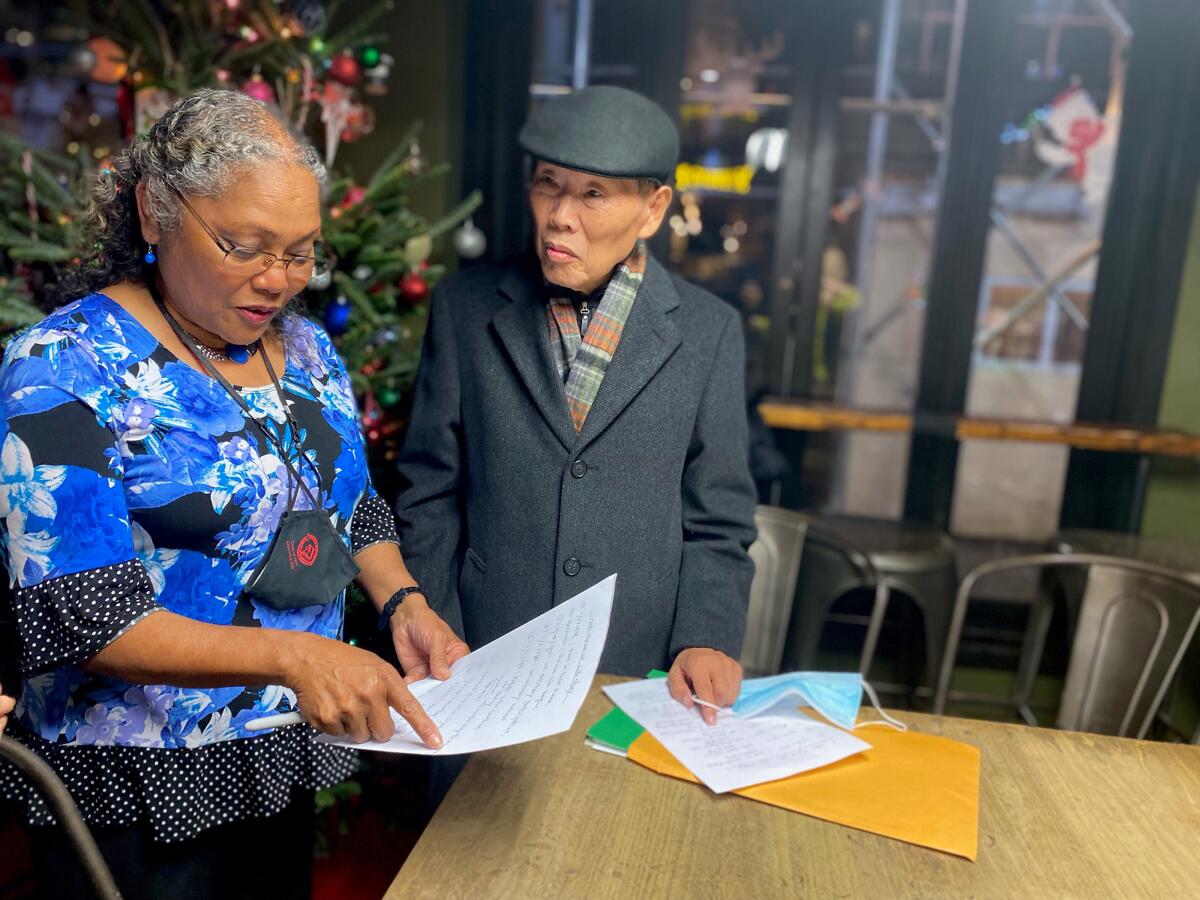
Then, last month, another revelation.
Yvette had told me that three of Omma’s siblings were alive, with a brother living in New Jersey. I wrote to him and his family six times, but my letters went unanswered.
Then last June, Yvette finally spoke by phone with Chan Il Choi, our uncle, and his son Woojin Choi. They acknowledged receiving my letters but were skeptical and concerned about fraud, which was understandable. They agreed to attend my book signing in New York City.
It’s Dec. 8 and the event is wrapping up when the door opens and a handsome 84-year-old Asian man of small stature walks in. Everyone gasps because I had just spoken about looking forward to laying eyes on my uncle, and there he stands with his hands in his pockets, with an apple hat and scarf. I try to hold back my tears but can’t.
“Why can’t your mother be here?” he says over and over, through an interpreter. “I wish she was here!”
The more a pregnant photographer spent documenting midwives, she began to reconsider where to give birth to her own child.
He says that Omma was 14 when she was separated from her family as they fled the North’s advancing terror in 1951. The family assumed she had been killed by the bombs surrounding them. Ten years passed before they reunited. I also learn that Omma had another brother, Chan Young, who was 11 when he drowned a year after I left Korea. Could he have been my Sonyeon?
Two days later, I get a call saying Uncle Chan is in the lobby of my hotel. We have no interpreter except our phones, but we both stare at each other and touch and silently recognize the spirit of my mother’s presence. Later, after we hug farewell, I watch him walk toward the bus. I still have so many questions and can’t wait until the next time we meet.
Saundra Henderson Windom is author of “Orchestration,” a memoir about growing up half Black, half Korean.
More to Read
Sign up for Essential California
The most important California stories and recommendations in your inbox every morning.
You may occasionally receive promotional content from the Los Angeles Times.
